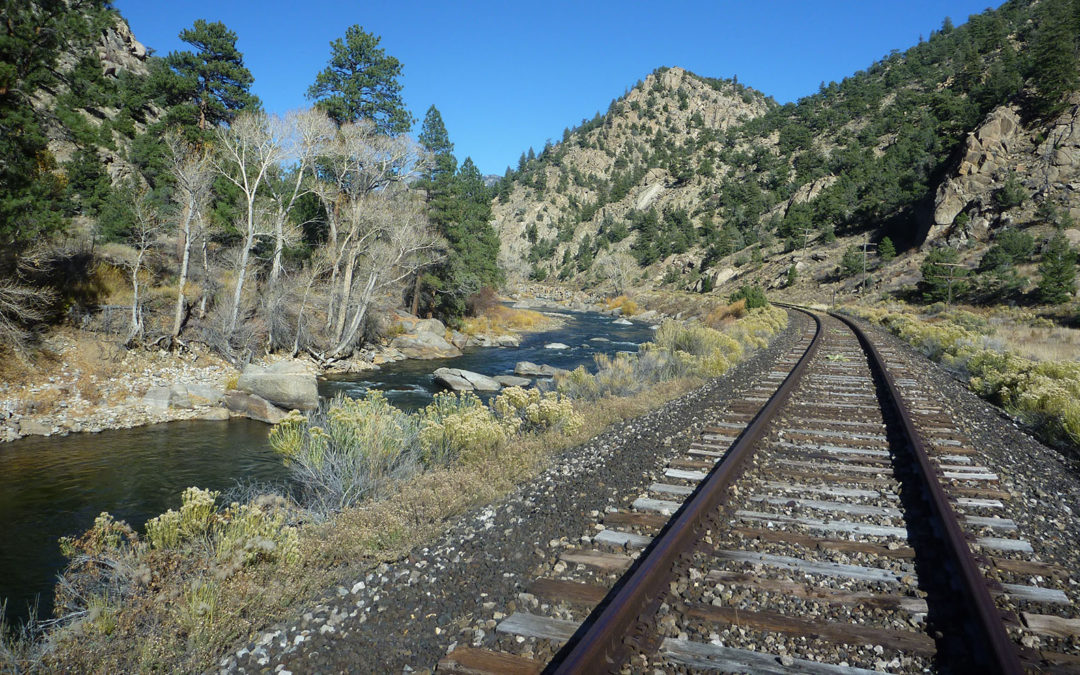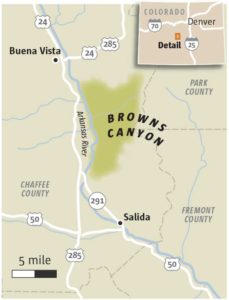Surface Transportation Board accepting comments through Jan. 28.
The Rio Grande Pacific railroad has announced that it will lease Union Pacific’s Tennessee Pass rail line from Eagle to Parkdale, near the Royal Gorge. According to a press release, Colorado Midland & Pacific Railway (CMP), a Rio Grande Pacific subsidiary, will lease a majority of the line and “assess the interest of the communities served by the Tennessee Pass line” for freight and passenger service.
Rio Grande Pacific has also been selected to develop and operate the proposed Uinta Basin Railway in Utah, which would carry crude oil to existing rail lines for transport to Gulf Coast refineries. The Tennessee Pass line would provide a “shortcut,” potentially sending Utah heavy crude through Browns Canyon.
The preferred route for the new rail line would slice across wilderness-quality lands in the Ashley National Forest. Other possible routes would also cross wilderness-quality Forest Service, BLM and/or tribal lands.
According to the DEIS, an estimated 3.68-10.52 trains per day would traverse the new rail line, and those trains, with approximately 100 oil tankers each, could then travel along the Arkansas River’s 102-mile stretch of Gold Medal trout waters, including Browns Canyon.
The Salt Lake Tribune reports, “The $1.4 billion rail line could increase industrial impacts by enabling Uinta Basin oil production to nearly quadruple to 300,000 barrels a day,” heavy crude oil that could eventually be transported through Browns Canyon National Monument.
Proposed and promoted by the Seven County Infrastructure Coalition, the Uinta Basin Railway has already come under fire after the Utah Community Impact Board (CIB) awarded the Infrastructure Coalition a $21.4 million grant to fund planning and environmental reviews to jumpstart the project.
Environmental groups filed a lawsuit demanding the money be returned to the Utah Permanent Community Impact Fund, which collects federal mineral royalties to fund projects in rural communities for the purpose of alleviating impacts associated with mineral extraction.
As reported by The Salt Lake Tribune, Wendy Park, an attorney with the Center for Biological Diversity, said, “This money is meant to help repair damage done by the fossil fuel industry, not subsidize it. … The board is supposed to help rural communities build health centers, libraries and other community facilities. Instead, it’s giving gifts to private oil companies and buying more pollution.”
The proposed Uinta Basin rail line became a local issue on New Year’s Eve when the Rio Grande Pacific announced it had leased the Tennessee Pass line from Union Pacific. The former Denver & Rio Grande Western route over the Continental Divide has been dormant since 1997 and will require significant rehabilitation work before it can operate again. The rail line has a history of derailments due to the challenging terrain it crosses.

